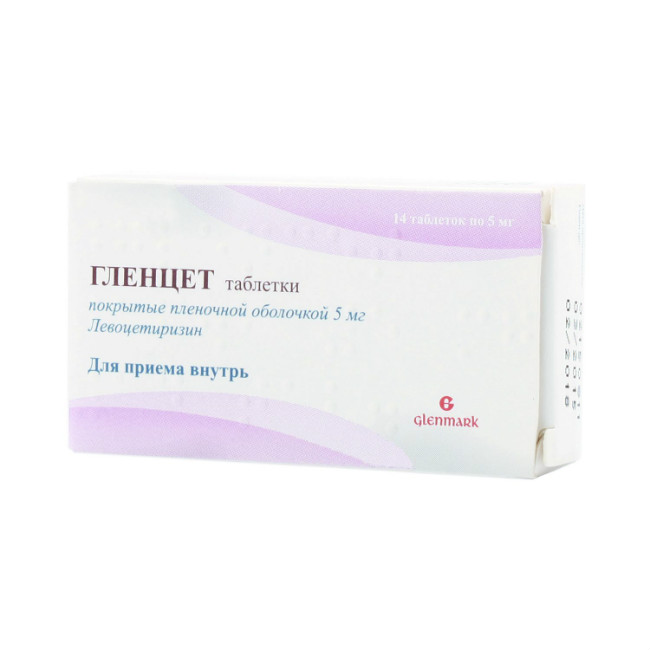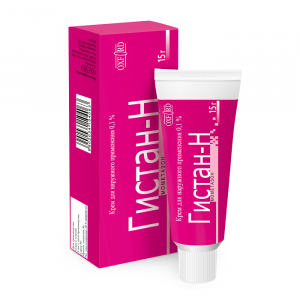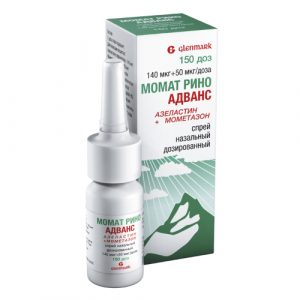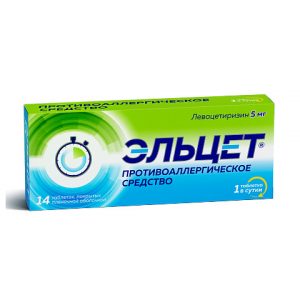Description
Release form
coated tablets
Packing
14 pcs.
Pharmacological action of
Levocetirizine, an enantiomer of cetirizine, a competitive histamine antagonist, blocks H1 histamine receptors, affinity for which is 2 times higher than that of cetirizine. It has an effect on the histamine-dependent stage of allergic reactions, reduces eosinophil migration, vascular permeability, and limits the release of inflammatory mediators.
Prevents the development and facilitates the course of allergic reactions, has an antiexudative, antipruritic effect, practically has no anticholinergic and antiserotonin effect. In therapeutic doses, sedation is very mild.
Action begins 12 minutes after taking a single dose in 50% of patients, after 1 h in 95% of patients and lasts for 24 hours.
Pharmacokinetics
Pharmacokinetics is linear. Quickly absorbed by ingestion, food intake does not affect the completeness of absorption, but reduces its speed.
Bioavailability – 100%. The time to reach the maximum concentration in the blood (TCmax) is 0.9 h, the maximum concentration in the blood (Cmax) is 207 ng / ml. Distribution volume is -0.4 l / kg. Communication with plasma proteins – 90%. Less than 14% of the drug is metabolized in the liver by O-dealkylation to form a pharmacologically inactive metabolite.
The elimination half-life (T1 / 2) is 7-10 hours. The total clearance is 0.63 ml / min / kg. It is completely excreted within 96 hours. It is excreted by the kidneys (85.4%). In renal failure (creatine clearance (CC) less than 40 ml / min), clearance decreases (in patients on hemodialysis – by 80%), T1 / 2 – lengthens. Less than 10% is removed during hemodialysis. Penetrates into breast milk.
Indications
Symptomatic treatment of urticaria, including chronic idiopathic urticaria Quincke’s edema of other allergic dermatoses, accompanied by itching and rashes.
Contraindications
Hypersensitivity (including to piperazine derivatives), severe chronic renal failure (CRF, CC less than 10 ml / min), pregnancy, lactation, children under 6 years of age.
Galactose intolerance, lactase deficiency and glucose-galactose malabsorption.
Precautions
Chronic renal failure (dosage adjustment required), advanced age (possibly reduced glomerular filtration).
Special instructions
Caution is required while drinking with alcohol.
Influence on the ability to drive vehicles and control mechanisms With an objective assessment, the effect of the drug on the ability to drive vehicles and control mechanisms when taking at the recommended dose was not reliably noted.
Nevertheless, during the period of taking the drug, it is advisable to refrain from engaging in potentially hazardous activities that require an increased concentration of attention and speed of psychomotor reactions.
Composition
Active substance:
levocetirizine dihydrochloride 5mg
Excipients:
lactose monohydrate (tablettose 100)
microcrystalline cellulose (Avicel PH 112)
colloidal silicon dioxide (Aerosil 200)
magnesium stearate
Opadry white
Dosage and administration
Take orally, with food or on an empty stomach, with a little water, without chewing.
Recommended dose for adults and children over 6 years of age, elderly patients (subject to normal renal function) – 5 mg (1 tablet) once a day.
The course of treatment for chronic diseases is up to 18 months.
Side effects of
Possible side effects are listed below for body systems and frequency of occurrence: often (> 1/10), infrequently (? 1/100,? 1/10), rarely (? 1/1000,? 1/100) , very rarely (? 1/10000,? 1/1000).
From the central nervous system
Infrequently: headache, fatigue, drowsiness.
Rarely: asthenia.
Very rarely: aggression, agitation, hallucinations, depression, convulsions. From the sensory organs: Very rarely: visual impairment.
From the digestive system: Infrequently: dryness of the oral mucosa.
Rarely: abdominal pain.
Very rare: nausea, diarrhea, hepatitis.
From the cardiovascular system: Very rarely: tachycardia.
From the respiratory system: Very rarely: dyspnea.
From the musculoskeletal system: Very rarely: myalgia. Metabolism: Very rare: weight gain.
Laboratory readings: Very rare: changes in liver function tests.
Allergic reactions: Very rare: itching, rash, urticaria, angioedema, anaphylaxis.
Drug interaction
Theophylline (400 mg / day) reduces the total clearance of levocetirizine by 16%, while theophylline kinetics does not change.
Joint use with macrolides or ketoconazole did not cause significant changes on the ECG.
May enhance the effects of drugs that inhibit the central nervous system and ethanol.
Overdose
Symptoms: drowsiness, in children anxiety, irritability.
Treatment: gastric lavage, activated charcoal, symptomatic therapy.
There is no specific antidote. Hemodialysis is ineffective.
Storage conditions
Store in a dry, dark place at a temperature not exceeding 30 ° C.
Deystvuyuschee substances
Levocetirizine
Dosage form
tablet
Appointment
Adult, Children28 years old, Children28 in adult, older than 6 years
Indications
Allergic rhinitis, Pollinosis, Quincke’s edema, Urticaria, Skin itching, Dermatosis, Allergic conjunctivitis Allergy, Neurodermatitis
Possible product names
GLOSSET 0.005 N14 TABLE S / O
GLOSSET TAB. P.P.O. 5MG No. 14
GLOSSET TAB. P / O CAPTURE. 5MG No. 14
Gletset tablet. p.p.o 5mg N14 India
GLENCET TABL.P.O. 5MG N14
Glenmark Pharmaceuticals Ltd, India




